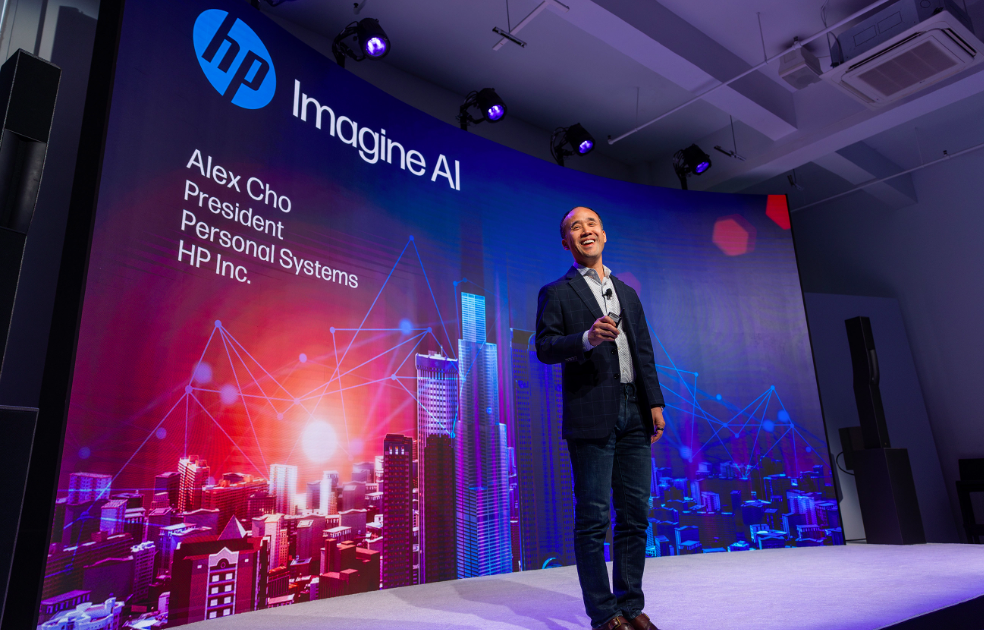Earlier this month, HP launched its OmniBook Ultra laptop and OmniStudio X desktop with built-in A.I. features—joining the likes of Microsoft (MSFT), Asus and Lenovo after their so-called A.I. PCs hit the market as the A.I. hype booms. Unlike traditional laptops, which are powered primarily by CPUs and GPUs, A.I. PCs contain a powerful additional chip called an NPU—short for neural processing unit—which enables stronger computing capacities that can help power generative A.I. features. Higher processing power also means these new computers can deploy energy-intensive large language models like OpenAI’s GPT on the device instead of the cloud, which could enhance data privacy.
Starting at $1,449.99, HP’s new computers include an “A.I. companion” chatbot that can summarize and analyze documents and has advanced video calling capabilities, such as gesture control and live captions translated into more than 40 languages, according to a press release. HP claims its A.I. PCs could help businesses and consumers save time and boost productivity.
“We’re bringing the A.I. PCs so that people can access the benefits of A.I. faster, more cost effectively, and more securely on a device like this,” Alex Cho, president of Personal Systems at HP, told Observer at the HP Imagine event on July 11 in New York City unveiling the computers.
Cho said the A.I. PC is a “core part” of HP’s strategy to boost revenue across its PC division after a two-year sales slump. While research suggests A.I. PCs have the potential to revive the declining PC market, experts have mixed views on whether A.I. capabilities are enough to convince customers to upgrade their regular laptops.
“I don’t expect that the A.I. PC category will fundamentally reshape the PC market, but I do expect A.I. PCs to transform it,” Olivier Blanchard, research director at The Futurum Group with expertise in the PC market, told Observer.
Blanchard said the introduction of on-device A.I. capabilities is “the biggest disruption to the PC market in decades.” These features, however, won’t necessarily be what gets customers to switch to an A.I. PC. Instead, “significant performance improvements” and “impressive battery life” of the laptops (HP claims its OmniBook has up to 21 hours of battery life) from the NPU would be the main driver.
“Powerful new A.I. features like assistants, agents and other generative A.I. applications probably won’t be the primary driver for consumer adoption right away,” Blanchard said. “But as users begin to experience them, and realize how much easier their lives and jobs will be thanks to these tools, the value of A.I. features will gain traction and accelerate demand for the category.”
A.I. PCs may be most appealing to businesses and creatives, followed by gamers and educators as they learn how A.I. apps on the device can benefit them, according to Anshul Sag, principal analyst at Moor Insights & Strategy who covers PCs. “I think A.I. PCs will change how we use our PCs, our expectations, and how apps behave,” Sag told Observer.
The A.I. in PC may just be a “marketing tactic”—for now
Yet, not all experts believe in the potential of these new computers. “At this stage, the A.I. PC is a marketing tactic, and little more,” HP Newquist, a self-proclaimed A.I. historian who wrote the e-book, The Brain Makers: The History of Artificial Intelligence, told Observer. That’s because tools like Microsoft’s Copilot are not limited to A.I. PCs, and the A.I. apps that roll out may still be “tapping into the internet” for much of their processing, meaning users won’t be reaping all the benefits the device has to offer, he said.
“The inclusion of high-powered A.I. processors on these machines are more a speed function at this point than an actual A.I. enhancement,” Newquist said regarding NPUs. “Until more A.I. apps are able to be run locally—and not relying on massive amounts of cloud power and storage—the A.I. processors won’t be utilized to their fullest potential.”
Nevertheless, experts agree that A.I. PCs are still fairly new and will continue to advance to include more native A.I. capabilities. Soon, HP will integrate A.I. tools like Beautiful.ai, which generates workplace presentations, and Polymer, which analyzes data, into its A.I. Companion app, according to the company. Apps that could translate American Sign Language into English, identify deep fakes, and provide real-time feedback on communication during video calls will also be added to HP computers.
If these A.I. apps can be contained in an all-in-one operating system with high performance, it’s possible A.I. PCs could one day make waves in the PC market.
“It’s a bit too soon to know what disruptive “killer apps” will emerge from that ecosystem, but what I have seen so far is already promising, useful and fun,” Blanchard said. “I haven’t been this excited about the future of personal computing both on the hardware and on the software side in a very long time.”

